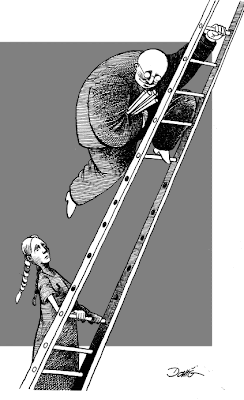Continuing from:
Day 219: Equality and Human Rights
Day 221: Are Humans Equal? – Equality and Human Rights – Part 2
Day 223: Equality of Opportunity: Introduction – Equality and Human Rights – Part 3
Day 225: Equality and Disinformation – Equality and Human Rights – Part 5
In the previous blog we discussed the problems that ensue when a word has not been clearly defined, and how one ought to agree upon a singular definition and thus use a particular word consistently with its agreed upon meaning, to be able to have a meaningful discussion (which so far hasn’t happened in the history of the concept of Equality).
We also saw that the ‘Great Divide’ on the subject of Equality has mostly been of an illusionary nature, exactly because of the lack of agreement on a definition of Equality. How can we say that there is a disagreement on a singular issue, when both parties mean completely different things with ‘the one issue’?
All of this came forth as we were looking at one of the arguments/justifications (Equal starting point/Equal Treatment leads to unequal outcomes – so why bother) as to why we should not enforce/promote Equality within society, as we had to investigate in which sense ‘equal’ and ‘unequal’ was used in the sentence.
Within this blog we will be looking at ‘what is equal’ and ‘what is unequal’ within using the definition of Equality as Life – where Humans are Equal by virtue of being Alive and being Animated by the same Life Force.
So, we have ‘Life’ as our starting point, as within this rests our Equality. Yet this this Life is not self-sustaining and particular conditions require to be in place for Life to thrive. We can then say, that any situation/circumstance which hampers the ability of Life to thrive, is one that is unequal or is a situation/circumstance within which inequality exists.
When we look at the statement ‘Equal starting point/Equal Treatment leads to unequal outcomes – so why bother ‘ from this perspective, we can clearly see that it does not make any sense, because having Life as one’s starting point cannot have the diminishment of Life as an outcome/end. And promoting Life as a value/principle cannot have the diminishment of Life as an outcome. So when statements are made about ‘what is equal’ and ‘what is unequal’ – we have to investigate/look at each point terms of measuring its relation to Life: does it enhance or does it reduce Life?
When we look at Equality and Unequal/Inequality from this perspective – a lot of the statements/justifications as to why Equality should not be pursued ‘fall away’, as the logic behind the statement becomes inconsistent. Here we can for instance look at the statement that to ‘be equal’ means to ‘genetically disable the able’. Such actions obviously do not enhance Life and thus does not promote Equality among human beings as each one enjoying an Equal Life Experience. When we speak of Equality and Inequality, we are thus bound to keep ourselves to subjects and topics which directly affect human beings’ Living Standard and Quality of Life. This does not mean ‘Equal Treatment’ in the sense of the distorted definition of ‘giving each one the Same Treatment’ – but to treat one Another Equally as to support and assist another to the utmost of our ability so that one can enjoy the Best Quality of Life Possible. Here we have to be clear that ‘the same’ and ‘equal’ – are two different, separate concepts. Different people have different needs – and thus depending on how much support and assistance one requires to reach a Standard of Living that is Optimal – one will receive ‘less’ or ‘more’ to attain this Level – but yet the Outcome is Equal – as Life is each time respected and supported to the greatest extent possible. When one is born with a particular disadvantage which leads a particular individual to experiencing their Life as being obstructed – then the necessary steps require to be taken to remedy this point to the utmost of our ability, to ensure that this person despite their ‘born disadvantage’ may still experience a Life of Quality, as the Life we would have wanted for ourselves would we have been in the same position. Failure to address such impediments to a Thriving Life, would be termed an ‘Inequality’ and would thus be a Problem which requires to be Corrected.
Within the next blog we will look at some more points/statements anti-egalitarians come up with in an attempt to refute the promotion of Equality within society – and how these arguments lose all validity once the factors and variables are intricately linked and connected to Life and the support thereof, as how we explained it in this blog.



























